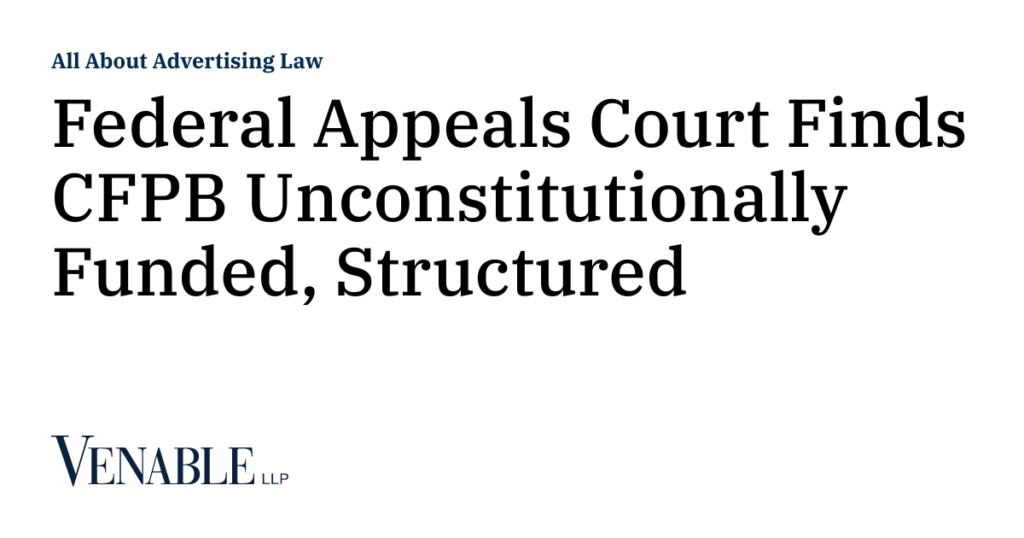Federal Appeals Court docket Finds CFPB Unconstitutionally Funded, Structured

[ad_1]
The Shopper Monetary Safety Bureau (CFPB) has as soon as once more been discovered to be unconstitutionally structured. The ruling is a win for CFPB critics and calls into query most actions taken by the company.
A unanimous three-judge panel of the U.S. Court docket of Appeals for the Fifth Circuit held on Wednesday that the CFPB’s funding mechanism, funded by charges generated by Federal Reserve Board not by way of Congressional appropriations, is unconstitutional. Based on the courtroom, the CFPB’s funding is double insulated from Congress and, thus, is unaccountable to each Congress and the general public. As such, the CFPB’s funding mechanism violates the Structure’s separation of powers design and, particularly, the Appropriations Clause.
CFPB funding mechanism “can’t be reconciled with the Appropriations Clause and the clause’s underpinning, the constitutional separation of powers”
The panel’s ruling in Shopper Monetary Providers Affiliation of America v. Shopper Monetary Safety Bureau, No. 21-50826, outcomes from a multi-year litigation difficult the CFPB’s Payday Lending Rule, finalized in 2017. The Shopper Monetary Providers Affiliation of America (CFSA), an business commerce group for small greenback lenders, challenged the rule and likewise challenged the CFPB’s constitutionality.
Whereas CFSA offered a number of the explanation why the CFPB is unconstitutional, the Fifth Circuit opinion relied on a problem to how the CFPB is funded. The panel’s determination constructed closely upon a concurring opinion from a earlier Fifth Circuit case explaining that the funding mechanism was unconstitutional.
Beneath the Dodd-Frank Act, Congress established the CFPB as half of the Federal Reserve System, with its funding coming from the Federal Reserve instantly. Moreover, the CFPB might ask the Federal Reserve for as a lot funding because it wants as long as the quantity requested doesn’t exceed 12 p.c of the Federal Reserve’s working bills. For instance, this yr, the CFPB may have requested as much as $734 million from the Federal Reserve, and certainly, it requested $641.1 million. As soon as the CFPB has requested an quantity from the Federal Reserve, the Federal Reserve “shall switch to the Bureau” the quantity requested. Neither the Federal Reserve nor Congress might assessment or revise that quantity.
In its opinion, the Fifth Circuit harassed that whereas the Structure’s Framers had meant that the ability of the purse and the ability of the sword be separate in our system of presidency, Congress had mixed the 2 into the CFPB. Based on the courtroom, the Appropriations Clause was intentionally added to the Structure in order that Congress would have unique energy over the federal purse.
The panel mentioned, “The Appropriations Clause… does greater than reinforce Congress’s energy over fiscal issues; it affirmatively obligates Congress to make use of that authority ‘to take care of the boundaries between the branches and protect particular person liberty from the encroachments of government energy’.”
The CFPB countered that as a result of Congress enacted the Bureau’s funding mechanism within the Dodd-Frank Act, that was sufficient to fulfill the Appropriations Clause. The CFPB additionally argued that since each different courtroom to think about the funding mechanism discovered it to be constitutional, the courtroom, right here, ought to too. The courtroom rejected each arguments.
First, it mentioned that the Appropriation Clause doesn’t simply require Congress to go a legislation to authorize funding, it should achieve this by way of an appropriation. Second, the panel disagreed with the opposite courts’ conclusion. Whereas different courts didn’t discover the CFPB’s funding mechanism mixed with its broad authority over shopper monetary providers constitutionally objectionable (e.g., PHH Corp. v. CFPB), the courtroom, right here, did. Finally, the courtroom decided that CFPB’s funding mechanism couldn’t be reconciled with the Appropriations Clause and the constitutional precept of separation of powers and is, thus, unconstitutional.
CFPB Payday Lending Rule Destiny
What does this imply for the Payday Lending Rule and different guidelines promulgated by the bureau? Based on the courtroom, whereas the CFPB didn’t have the lawful cash essential to promulgate the rule, it did have the authority to promulgate the rule. In consequence, underneath present Supreme Court docket precedent, which means guidelines promulgated by the CFPB should not mechanically invalid because of the unconstitutional funding mechanism. As an alternative, litigants difficult a rule promulgated by the CFPB should present that the unconstitutional funding mechanism precipitated them hurt for the rule to be invalidated.
For CFSA, that is simple. The courtroom mentioned, “As a result of the funding employed by the Bureau to promulgate the Payday Lending Rule was wholly drawn by way of the company’s unconstitutional funding scheme, there’s a linear nexus between the infirm provision (the Bureau’s funding mechanism) and the challenged motion (promulgation of the rule). . . . Plaintiffs have been thus harmed by the Bureau’s improper use of unappropriated funds to have interaction within the rulemaking at subject.”
Broader Penalties for the CFPB
The Fifth Circuit’s reasoning would appear to use to any rule promulgated by the bureau. Certainly, the ruling appears to have laid the groundwork for each rule promulgated by the bureau to be invalidated. The identical would appear to use to examination findings and enforcement actions taken by the CFPB.
Given the huge implications of this case, the CFPB will search to overturn the panel’s determination. The CFPB may both attraction the choice to the entire Fifth Circuit (i.e., a assessment en banc) or search a keep and ask the Supreme Court docket to assessment the choice. Prior to now, the CFPB opted first for an en banc assessment earlier than making its strategy to the Supreme Court docket however given the conservative leanings of the Fifth Circuit the CFPB might skip that step. Within the meantime, the panel’s determination is binding on federal district courts in Texas, Louisiana, and Mississippi, and the CFPB’s constitutionality is more likely to now be challenged in different courts by plaintiffs dealing with down a CFPB enforcement motion.
* * * * *
Extra Upcoming Occasions
Venable Reception on the ACC Annual Assembly and Cash 20/20 Convention
October 24, 2022 | Las Vegas, NV
“Regulatory Spherical-up & Creating Higher, Compliant Buyer Engagement Experiences” on the Leadscon Consent Summit 2022
October 26, 2022 | Washington, DC
Month-to-month Promoting Legislation Webinar Collection: The Ins & Outs of Understanding Knowledge Rights in Promoting Agreements
November 3, 2022 | Webinar
“Shopper Monetary Providers Authorized and Regulatory Replace” on the Monetary Counseling Affiliation of America’s 2022 Annual ConventionNovember 4, 2022 | Fort Lauderdale, FL
Venable on the 2022 ANA Masters of Promoting Legislation Convention
November 8 – 10, 2022 | Hollywood, FL
[ad_2]
Source_link








